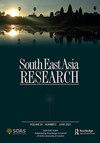昂山素季与种族清洗:“缅甸方式”民主的黑暗面
IF 0.9
3区 社会学
0 ASIAN STUDIES
引用次数: 1
摘要
摘要缅甸经历了半个多世纪的军事统治后,2011年开始了民主过渡。登盛将军于2011年至2016年建立了文官政府,然后在2016年,这位“国父”的女儿昂山素季上台。但昂山素季政府不得不与军方分享权力,因为宪法为他们提供了至关重要的特权。随后,在昂山素季任期内对罗兴亚民族宗教团体采取残酷行动后,国际社会指责她的政府没有采取任何行动来阻止种族清洗和种族灭绝。这篇文章探讨了为什么昂山素季作为一个新兴民主国家的领导人,未能保护罗兴亚人免受种族清洗。争论的焦点是全国范围内的反罗兴亚情绪、缅甸不稳定的民主、昂山素季的选举进程、军政府和文官政府之间的权力失衡以及昂山素季的政策向军队倾斜,以及这些因素如何导致种族清洗和种族灭绝。迈克尔·曼关于民主“黑暗面”的理论适用于昂山素季领导下的缅甸民主,研究了民主与镇压、种族清洗和对罗兴亚少数民族的种族灭绝之间的联系。本文章由计算机程序翻译,如有差异,请以英文原文为准。
Aung San Suu Kyi and ethnic cleansing: the dark side of ‘Myanmar way’ democracy
ABSTRACT After more than half a century of military rule in Myanmar, a democratic transition started in 2011. General Thein Sein established a civilian government from 2011 to 2016, and then in 2016 Aung San Suu Kyi, the daughter of the ‘father of the nation’, came to power. But Suu Kyi’s government had to share power with the military, as the constitution provided them vital privileges. Subsequently, following brutal actions against the Rohingya ethnoreligious group during Suu Kyi’s tenure, the international community accused her government of doing nothing to stop ethnic cleansing and genocide. This article examines why Aung San Suu Kyi, as leader of a fledgling democracy, failed to protect the Rohingya from ethnic cleansing. The arguments centre on the countrywide anti-Rohingya sentiment, Myanmar’s unstable democracy, Suu Kyi’s election process, the power imbalance between military and civilian governments and Suu Kyi’s policy tilt towards the military, and how these factors contributed to ethnic cleansing and genocide. Michael Mann’s theory on the ‘dark side’ of democracy, here applied to Myanmar’s democracy under Aung San Suu Kyi, examines how it connects with repression, ethnic cleansing and genocide of the Rohingya minority.
求助全文
通过发布文献求助,成功后即可免费获取论文全文。
去求助
来源期刊

South East Asia Research
ASIAN STUDIES-
CiteScore
1.90
自引率
0.00%
发文量
42
期刊介绍:
Published three times per year by IP Publishing on behalf of SOAS (increasing to quarterly in 2010), South East Asia Research includes papers on all aspects of South East Asia within the disciplines of archaeology, art history, economics, geography, history, language and literature, law, music, political science, social anthropology and religious studies. Papers are based on original research or field work.
 求助内容:
求助内容: 应助结果提醒方式:
应助结果提醒方式:


